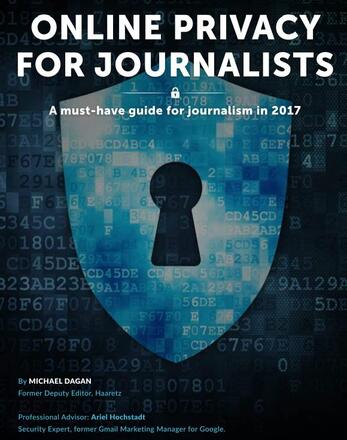
Online privacy for journalists. A must-have guide for journalists in 2017
Michael Dagan, senior editor and former deputy editor at Haaretz , drafted this online privacy guide in the context of an increasing fear for freedom of speech and freedom of the press online. This guide offers a series of suggestions for journalists on how to keep their data and sources anonymous when working in the cyberspace, including the specific apps and services they could use.
With regard to communications with sources and safeguarding sensitive data, journalists should always encrypt everything. Moreover they should perform a full disk encryption. Journalists should avoid chatting with sources on the phone if not using secure call services and messengers. Moreover, they should avoid using organizational chats. With regard to the protection of data, Dagan suggests the use of passphrases, i. e. random combinations of words, as well as two-factor authentications and assigning a computer for inspecting suspicious files/attachments. The guide also suggests journalists on how to buy their own secured computer (namely, in a second-hand store for cash). Moreover, it suggests to educate sources to communicate safely via safe devices and, in the meanwhile, journalists should use designated secure systems for receiving documents, carefully selecting the clouds they use (e.g. trying to avoid Dropbox and Google Drive).
Concerning online anonymity, journalists should avoid being tracked while browsing, because it can disclose or provide hints of the story you are working on.
For this reason, the guide suggests a private browsing mode and to use alternative browsers such as TOR. Alternative search engines should be used as well, such as DuckDuckGo instead of Google. Also, deleting the DNS (Domain Name System) cache is useful, as well as trying to avoid HTML Web Storage. Using a VPN (Virtual Private Network) is also a good idea, because it encrypts all your communications. Finally, proxy servers can be useful since they substitute your IP address with theirs.
To conclude, the guide suggest journalists on how to secure and maintain the confidentiality of their email, using safe extensions, secure email providers and encrypting such emails.
To sum up, this guide’s tips recommend to isolate your devices and their environment; secure on-device applications and functions; act cautiously both in the digital and real world.
Tags: Cybersecurity Privacy Digital rights Digital safety Encryption Investigative journalism Journalism education Safety of journalists SurveillanceThe content of this article can be used according to the terms of Creative Commons: Attribution-NonCommercial 4.0 International (CC BY-NC 4.0) . To do so use the the wording "this article was originally published on the Resource Centre on Media Freedom in Europe" including a direct active link to the original article page.

